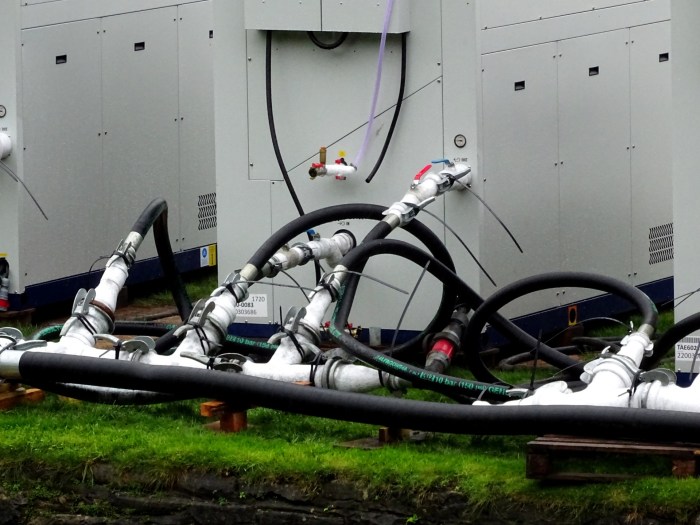
Industrial Supply Chain Management is like the backbone of modern business, connecting various elements that ensure products move smoothly from manufacturers to consumers. It’s fascinating to see how every piece—from logistics and transportation to cutting-edge technology—plays a crucial role in making this complex system function efficiently.
This management discipline not only streamlines operations but also enhances productivity and reduces costs, making it essential for any industry looking to thrive in today’s competitive market. Understanding its components gives us valuable insights into how businesses can leverage supply chains for better performance.
Industrial Supply Chain Management Overview
Industrial Supply Chain Management (ISCM) is a crucial framework that encompasses the planning, execution, and monitoring of supply chain activities necessary to create and deliver products efficiently. The main objective of ISCM is to maximize customer value while minimizing costs, ensuring that all components work synergistically to adapt to market demands. Understanding its key components, the role of logistics, and the impact of technology is essential for businesses aiming to enhance their supply chain operations.The key components of Industrial Supply Chain Management include procurement, production, distribution, and inventory management.
Each of these components plays a vital role in ensuring that the supply chain operates smoothly. Procurement involves sourcing materials and components needed for production. Production refers to the processes that transform raw materials into finished products. Distribution focuses on delivering the final products to customers through various channels. Finally, inventory management ensures that the right amount of stock is available at the right time, balancing supply and demand while minimizing excess costs.
Importance of Logistics and Transportation in the Supply Chain
Logistics and transportation are the backbone of any supply chain, directly affecting the speed and efficiency with which products reach consumers. Efficient logistics ensure that materials and products are moved in a timely and cost-effective manner, impacting overall operational efficiency. Additionally, the choice of transportation modes influences delivery times and costs, which are critical factors for customer satisfaction.
Transportation modes can be categorized into several types, each with its benefits
- Road Transportation: Offers flexibility and is ideal for short to medium distances, allowing door-to-door service.
- Rail Transportation: Cost-effective for large volumes over long distances, especially for bulk goods.
- Air Transportation: The fastest mode, suitable for high-value or time-sensitive goods, though it is more expensive.
- Sea Transportation: Ideal for international shipping of large quantities, balancing cost and speed effectively.
Logistics also encompasses warehousing, order fulfillment, and inventory management, all of which must be seamlessly integrated to ensure that the supply chain operates efficiently. A well-organized logistics system can lead to reduced operational costs and improved service levels.
Role of Technology in Optimizing Supply Chain Processes
Technology plays an essential role in modernizing and optimizing supply chain processes, enabling organizations to respond quickly to market changes and consumer demands. Advances in technology affect various aspects of the supply chain, including inventory management, data analytics, and communication.
Key technologies that enhance supply chain performance include
- Enterprise Resource Planning (ERP) Systems: Centralize data and streamline processes across the supply chain, improving decision-making.
- Warehouse Management Systems (WMS): Optimize inventory tracking and management, increasing efficiency and accuracy in warehousing operations.
- Internet of Things (IoT): Connect devices and sensors, providing real-time data on inventory levels, equipment status, and shipment locations.
- Blockchain Technology: Enhances transparency and traceability in supply chains, ensuring data integrity and reducing fraud.
By leveraging these technologies, companies can achieve greater visibility and control over their supply chain processes, resulting in improved operational efficiency and customer satisfaction.
“Optimizing supply chain processes through technology can lead to significant cost savings and enhanced service delivery.”
Employment and Work in Supply Chain Management
The field of supply chain management offers a diverse array of career opportunities, reflecting the complexity and importance of this sector in today’s economy. As companies strive for efficiency and effectiveness in their operations, the demand for skilled professionals in supply chain management continues to grow. This section will explore the various roles available, the skills and qualifications needed, and the impact of automation on employment in this industry.
Career Opportunities in Supply Chain Management
The supply chain sector encompasses a variety of roles that are essential to the movement of goods and services. Here are some key positions that one can find in this dynamic field:
- Supply Chain Analyst: Responsible for analyzing data and performance metrics to improve supply chain processes.
- Logistics Manager: Oversees the transportation and storage of goods, ensuring timely delivery and cost-effectiveness.
- Procurement Specialist: Manages purchasing decisions and supplier relationships to optimize resources.
- Inventory Control Manager: Handles inventory management strategies to maintain optimal stock levels.
- Operations Manager: Focuses on enhancing efficiency and productivity within supply chain operations.
- Warehouse Manager: Directs warehouse activities, ensuring safe and efficient storage and distribution of products.
These roles reflect just a portion of the opportunities available in supply chain management, showcasing the variety of paths one can take within this field.
Skills and Qualifications for Supply Chain Professionals
To succeed in supply chain management, professionals should possess a mix of technical skills and soft skills. The following skills are vital for those looking to enter or advance in this industry:
- Analytical Skills: Ability to interpret data and make data-driven decisions is essential for optimizing supply chain processes.
- Communication Skills: Effective communication is crucial, as collaboration with various stakeholders is a regular part of the job.
- Project Management: Skills in managing projects ensure that supply chain initiatives are delivered on time and within budget.
- Negotiation Skills: The ability to negotiate with suppliers can lead to cost savings and better terms for the organization.
- Technical Proficiency: Familiarity with supply chain management software and tools is increasingly important.
Education plays a significant role in securing a position in this field. A degree in supply chain management, logistics, business administration, or a related field is often preferred, alongside relevant certifications like Certified Supply Chain Professional (CSCP) or Certified in Production and Inventory Management (CPIM).
Impact of Automation on Jobs in Supply Chain Management
Automation is transforming the supply chain landscape, enhancing efficiency while also reshaping job roles. The integration of technologies such as artificial intelligence, robotics, and data analytics is leading to significant changes in how supply chains operate. While some positions may be at risk due to automation, new opportunities are emerging. For instance, roles that involve the management and oversight of automated systems are on the rise.
Additionally, professionals who can analyze and interpret data generated by these systems are becoming increasingly valuable.
“Automation in supply chain management is not just about reducing costs; it’s about optimizing processes and enabling a more agile response to market demands.”
Real-life examples illustrate this trend. Companies like Amazon have implemented advanced automation in their warehouses, using robots to pick and pack items, resulting in faster delivery times and reduced labor costs. Conversely, this has created a demand for skilled technicians who can maintain and troubleshoot these automated systems.In summary, supply chain management is a field rich with opportunities, requiring a blend of specific skills and adaptability to the evolving technological landscape.
As automation continues to play a pivotal role, professionals in this sector must embrace change to remain competitive and effective.
Interconnected Industries and Their Influence

The industrial supply chain is a complex network that connects various industries, each impacting the others in significant ways. Understanding these relationships is crucial for optimizing supply chain processes and enhancing overall efficiency. This segment explores the ties between industrial supply chain management and telecommunications, the influence of textiles and nonwovens, and compares the roles of domestic services and industrial goods.
Relationship Between Industrial Supply Chain Management and Telecommunications
The telecommunications sector plays an essential role in modern industrial supply chains by enabling real-time communication and data exchange. This synergy is critical for tracking inventory levels, forecasting demand, and streamlining logistics operations. Telecommunications facilitate:
- Real-time Data Sharing: Instant access to information allows companies to make informed decisions quickly, reducing delays in the supply chain.
- Enhanced Collaboration: With effective communication networks, stakeholders can collaborate seamlessly across different locations, benefiting from improved coordination.
- Integration of Technologies: Technologies such as IoT (Internet of Things) depend on robust telecommunication networks, enhancing supply chain visibility and traceability.
“The efficiency of an industrial supply chain can be significantly amplified through the effective use of telecommunications.”
Influence of Textiles and Nonwovens on Supply Chain Processes
Textiles and nonwovens are vital components in various industries, including fashion, automotive, and healthcare. Their influence on supply chain processes can be seen in several key areas:
- Material Sourcing: The availability and procurement of high-quality raw textiles and nonwovens can dictate the speed and cost of production processes.
- Inventory Management: Fluctuations in demand for textile products necessitate agile inventory strategies to avoid overstock or stockouts.
- Production Scheduling: The nature of textile production often requires precise scheduling to synchronize with seasonal trends or market demands, impacting the entire supply chain timeline.
Comparison of Domestic Services and Industrial Goods in Supply Chain Efficiency
Domestic services and industrial goods each play distinct roles in contributing to supply chain efficiency. While they may appear different, their integration is essential for a holistic approach to supply chain management.
- Domestic Services: Services such as logistics, warehousing, and customer service enhance the final delivery of products, ensuring customer satisfaction and timely fulfillment.
- Industrial Goods: The efficiency of producing and distributing industrial goods directly affects a company’s ability to meet market demands, impacting overall supply chain performance.
- Interdependence: A well-functioning supply chain requires the balance of both domestic services and industrial goods. For instance, the efficient transport of industrial goods relies on effective domestic service operations.
“Optimizing the balance between domestic services and industrial goods is key to achieving a responsive and resilient supply chain.”
Conclusive Thoughts

In wrapping up our discussion, it’s clear that Industrial Supply Chain Management is vital for operational success and competitiveness. With continuous advancements in technology and the integration of diverse industries, the way we manage supply chains will keep evolving, offering new opportunities and challenges that professionals must navigate effectively.
Top FAQs
What are the main components of supply chain management?
The main components include planning, sourcing, manufacturing, logistics, and delivery.
How does technology impact supply chain management?
Technology enhances efficiency, transparency, and data analysis, leading to optimized processes.
What career opportunities are available in supply chain management?
Opportunities range from logistics coordinators to supply chain analysts, managers, and consultants.
What skills are necessary for a career in supply chain management?
Key skills include analytical thinking, problem-solving, communication, and proficiency in supply chain software.
How is automation affecting jobs in the supply chain sector?
Automation can lead to efficiency gains but may also reduce the need for certain manual jobs, requiring workers to adapt to new roles.





